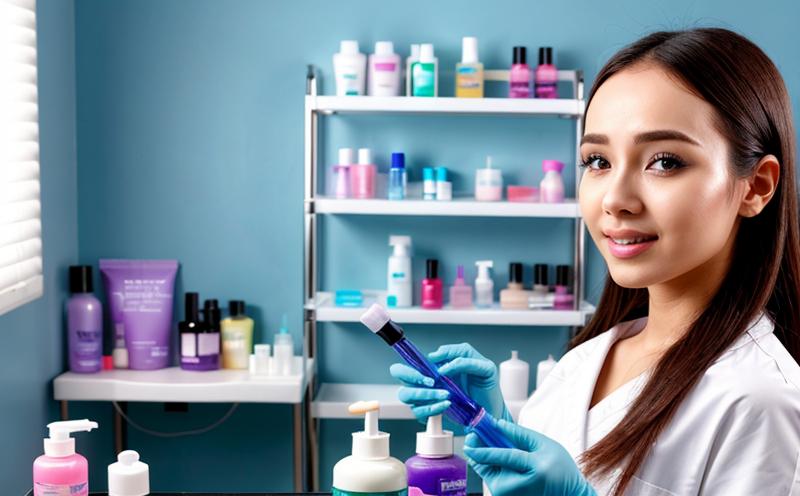USP Microbiological Examination of Non-Sterile Products
The USP [1] 61 1 Microbiological Examination of Non-Sterile Products is a critical standard for ensuring the safety and quality of cosmetic, personal care products, and other non-sterile pharmaceuticals. This examination is designed to identify potential microbial contamination that could impact product stability and consumer health.
The test encompasses several key parameters: total bacterial count, yeast and mold count, presence/absence of specified pathogens (like Staphylococcus aureus or Pseudomonas aeruginosa), and the overall microbial load. These assessments are conducted using standardized methods that comply with USP guidelines.
The primary goal is to ensure compliance with regulatory standards, which helps in maintaining product safety and consumer trust. This service plays a pivotal role in safeguarding public health by preventing potentially harmful products from reaching the market.
To achieve accurate results, the process involves meticulous sample preparation, inoculation into appropriate media (such as Bordet-Gengou for anaerobic bacteria or Sabouraud Dextrose Agar for fungi), and incubation under controlled conditions. Specimen analysis is performed using advanced microbiological techniques like colony counting, gram staining, and biochemical tests.
The significance of this examination cannot be overstated as it directly influences the safety profile of non-sterile products used daily by millions of consumers worldwide. By adhering to strict protocols outlined in USP , laboratories ensure that only high-quality, safe products enter the market.
In addition to meeting regulatory requirements, compliance with this standard also enhances brand reputation and customer confidence. It demonstrates a commitment to quality control and consumer safety, which are essential for maintaining long-term relationships with suppliers and distributors.
| Test Parameter | Description |
|---|---|
| Total Bacterial Count (TBC) | Determines the number of viable bacteria present in a given sample, indicating potential contamination levels. |
| Yeast and Mold Count | Evaluates the presence and quantity of yeasts and molds within the product, which are important indicators for spoilage and allergenic reactions. |
| Specific Pathogen Detection (e.g., S. aureus, P. aeruginosa) | Identifies whether specified pathogens are present in the sample, posing a risk to immunocompromised individuals or those with specific allergies. |
| Total Microbial Load (TML) | Represents an overall measure of microbial content in the product, including bacteria, fungi, and other microorganisms. |
The USP examination is not only a technical exercise but also a crucial step towards ensuring public health. It helps manufacturers maintain consistent quality standards across their production processes while minimizing risks associated with microbial contamination.
In summary, the USP Microbiological Examination of Non-Sterile Products serves as a vital safeguard against potential hazards posed by non-sterile products. Its implementation ensures that only safe and high-quality products reach consumers, thereby fostering trust in both industry practices and regulatory frameworks.
Applied Standards
The USP [2] 61 Microbiological Examination of Non-Sterile Products strictly adheres to the standards set forth in the United States Pharmacopeia (USP). This service is designed to comply with these rigorous guidelines, ensuring accurate and reliable test results.
The methodology employed aligns closely with USP [3] chapters 71, 72, 74, and 81, which provide detailed instructions on sample preparation, inoculation procedures, incubation conditions, and data interpretation. These standards are internationally recognized for their accuracy and reliability.
The use of USP methods guarantees consistency in testing protocols across different laboratories, allowing for precise comparison of results. This uniformity is crucial for maintaining high-quality standards within the industry.
By adhering to these stringent criteria, we ensure that our clients receive reliable data that can be used confidently when making decisions about product safety and quality. Compliance with USP not only meets regulatory expectations but also enhances overall product reliability.
Industry Applications
The USP [4] 61 Microbiological Examination of Non-Sterile Products finds extensive application across various sectors, particularly in the cosmetic and personal care industries. Here are some key areas where this service is utilized:
- Cosmetics: Ensures that makeup, skincare products, and other topical applications do not contain harmful microorganisms.
- Toiletries: Guarantees hygiene in toothpaste, mouthwash, and other oral care products by detecting potential pathogens.
- Baby Products: Protects infants from exposure to dangerous bacteria and fungi through thorough microbial examination of diaper creams, lotions, and powders.
- Home Care Products: Validates the safety of cleaning agents, disinfectants, and other household items used in personal care routines.
In each application, this service plays a crucial role by identifying any microbial contaminants that could compromise product effectiveness or cause adverse health effects. The rigorous testing ensures that only safe products are released into the market, upholding the highest standards of hygiene and safety.
Through its widespread use in these industries, USP contributes significantly to public health by preventing the spread of infectious diseases and ensuring consumer satisfaction with quality-assured products.
Customer Impact and Satisfaction
- Enhanced Consumer Trust: Compliance with stringent microbiological examination standards fosters trust among consumers regarding product safety and efficacy.
- Increased Market Share: Meeting regulatory requirements can lead to increased market share due to a reputation for reliability and quality.
- Improved Product Quality: Regular testing ensures that only high-quality products are released, thereby enhancing overall customer satisfaction.
- Reduced Legal Risks: Adherence to USP minimizes the risk of legal action related to product safety issues or recalls.
- Positive Brand Image: Consistent compliance with industry standards enhances brand reputation and loyalty among customers.
In summary, implementing the USP [5] 61 Microbiological Examination of Non-Sterile Products significantly impacts customer satisfaction and loyalty by ensuring product safety, quality, and regulatory compliance.





